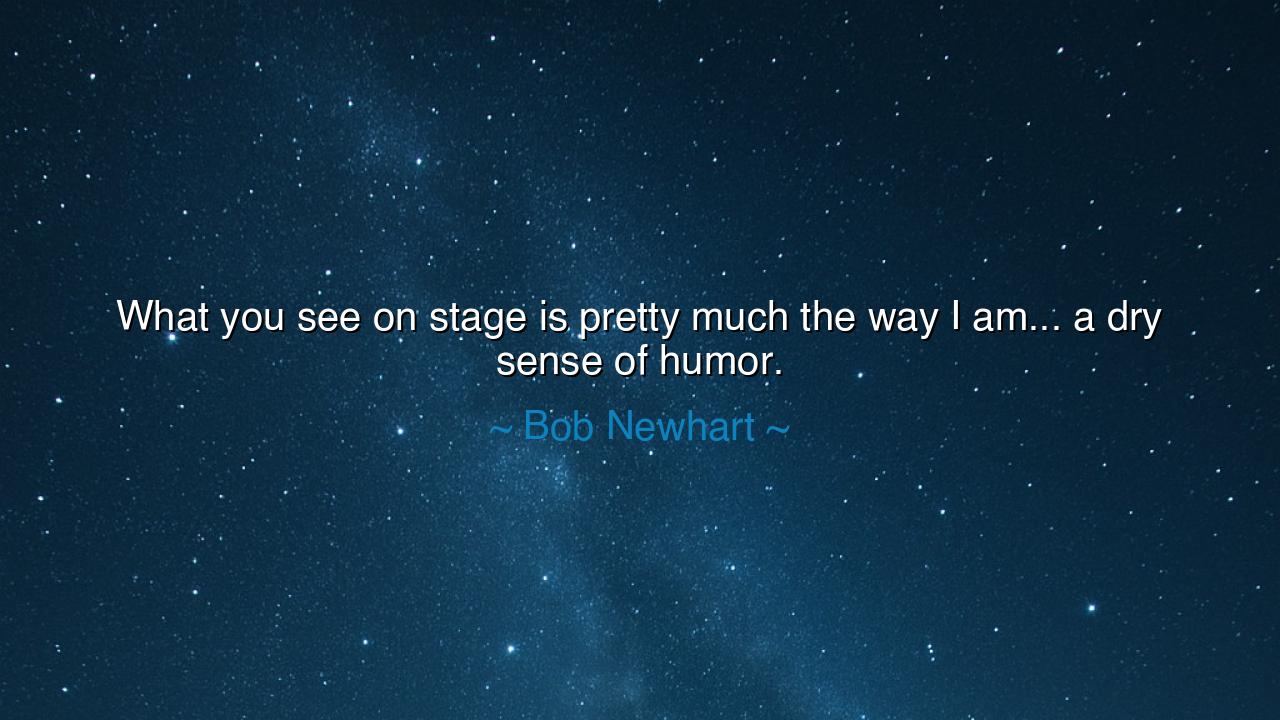
What you see on stage is pretty much the way I am... a dry sense






In the great expanse of human expression, where the words of philosophers echo through the halls of history, there exists a rare and quiet force—humor. It is not loud, nor boisterous, nor does it demand attention. No, humor in its truest form is subtle, like a river flowing silently beneath the surface, yet powerful in its ability to shape the lives it touches. Bob Newhart, a master of this craft, once said, "What you see on stage is pretty much the way I am... a dry sense of humor." With these words, Newhart revealed a truth as ancient as time itself: humor is not always in the words we speak, but in the way we live, the way we carry ourselves, and in the subtle nature of our very being.
In the grand tradition of the wise men and women of old, we know that true wisdom is often found in restraint, in the quiet moments that speak louder than a thousand proclamations. Newhart's dry humor is not the loud, boisterous laughter that fills the air like thunder, but the soft, measured humor that slips in like a gentle breeze, unnoticed at first, yet leaving its mark on all who experience it. Dry humor is not a force of grand gestures; it is a sharp, yet gentle revelation of the absurdity in the world around us. It speaks to us not through exaggeration or flamboyance, but through a quiet recognition that life, in all its magnificence and mystery, is sometimes ironic and unpredictable.
This kind of humor has roots deep in the ancient world, where the great philosophers and sages often expressed their truths not in loud declarations, but through wit and irony. Socrates, for instance, did not shout his wisdom from the rooftops. Rather, he gently guided his students through careful questioning, leading them to realize the truth for themselves. The humor in his teachings was not always overt—it was found in the irony of the human condition, in the gap between what we think we know and what we truly understand. Newhart’s style of humor follows this ancient tradition: it is not the humor of the jester, but the humor of the sage, who speaks quietly, but whose words carry the weight of profound truth.
Consider the story of Marcus Aurelius, the great Stoic emperor, who ruled with wisdom and discipline. While history remembers him for his strength and his leadership, there is an undercurrent of humor in his writings, though subtle and understated. In his "Meditations," we find moments of sharp irony as he reflects on the fleeting nature of life and the absurdity of human vanity. His humor was not born of laughter but of a deep, knowing smile at the world’s contradictions. Like Newhart, Marcus understood that the greatest truths are often expressed in the simplest, most understated ways.
Bob Newhart’s humor, then, is not a mere performance—it is a reflection of who he is. He brings forth a dry humor that mirrors the quiet wisdom of the ancients. It is not in the loud and obvious that we find truth, but in the subtle and quiet moments that make us pause and reflect. His comedy does not demand attention; rather, it invites us to lean in, to listen, and to appreciate the humor that lies beneath the surface. This is the essence of dry humor: it is not forced, but flows naturally, like a river that carves its path slowly, shaping the landscape over time.
Let us then, in our own lives, reflect upon the lesson of Bob Newhart. Too often, we seek to make ourselves known through grand gestures, through loud proclamations, or through bold displays. But the greatest truths and the most powerful humor come not through force, but through subtlety. Like the great philosophers before him, Newhart teaches us that the path to wisdom is often quiet, and that true humor comes from a place of restraint and observation, not exaggeration or spectacle.
In our own pursuit of wisdom and humor, let us not seek the spotlight or the loud applause, but rather the quiet recognition of life's simple truths. Dry humor is an invitation to see the world as it truly is, without the need for embellishment or pretense. It is the art of understanding that the absurdities of life are often best expressed in the simplest of ways. So, let us live with this quiet humor, this subtle recognition of life’s inherent contradictions, and in doing so, may we bring a sense of peace and wisdom to those around us. Humor, like life itself, need not be loud to be profound—it simply needs to be true.






AAdministratorAdministrator
Welcome, honored guests. Please leave a comment, we will respond soon